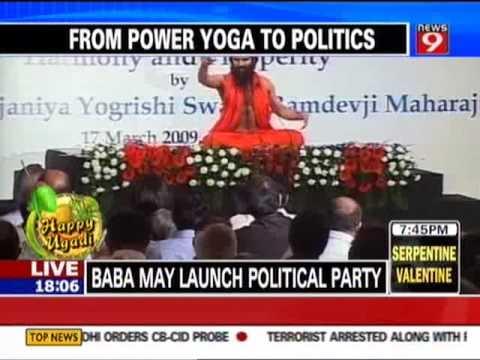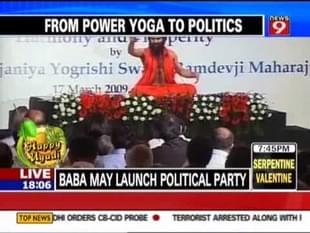Commentary
Evaluating Baba Ramdev's Ambitions
Mpanj
Jun 04, 2011, 07:49 PM | Updated Apr 29, 2016, 03:03 PM IST
Save & read from anywhere!
Bookmark stories for easy access on any device or the Swarajya app.


Revolutions are seldom engineered or engendered. Revolutions unfold at their own pace, when key drivers have attained a critical mass. Once that inflection point is reached, a catalytic leader (or leadership) emerges to grab the proverbial bull by the horns. Such a leader is blessed with all the unique qualities/traits needed to lead the revolution. One such inflection point appears to have been reached in India’s incipient battle against corruption.
On almost any scale and by any measure corruption across India has reached pandemic proportions. It has left no community, region or strata of society untouched. Most importantly, the failure of ordinary Indians to confront and eliminate this monster has undermined belief in India’s age old Dharmic traditions. It appears that Indians have reconciled to the corruption and rapacious loot of their beloved nation as part and parcel of their national destiny. Each-man-for-himself (or at best, for his family) has become the defining mantra. While it’s the contemporaneous moral fiber that is dramatically crumbling, its ancient traditions are being blamed for this weak-kneed response. Steep moral decline is further accentuated by stark leadership deficit. Scout around and all one gets is a handful of public figures with impeccable personal integrity. Arun Shourie, Narendra Modi, Kiran Bedi and Baba Ramdev stand out as few honorable exceptions. Unfortunately those who retain public goodwill and respect lack the resources or the stomach or structural support or pan Indian acceptance to spearhead war against corruption.
India’s multitude of castes, religions, languages, coupled with her first-past-the-post parliamentary system lends itself perfectly to divide-and-rule politics. Though it is seemingly impossible to nurture even an iota of optimism in this scam-a day scenario, all is not lost. As Abe Lincoln very aptly put it: “You can’t fool at the people all the time”. This strategy of divide-and-rule will have to eventually run its course. After tumultuous days of Mandal, Ka-Mandal, Ram Janmabhoomi, India is tentatively inching towards a search for sort of post- identity political anchor. This is is not merely due to the ‘law of diminishing returns’ kicking in but due to increased appreciation and adoption of innovative governance models that have been pioneered in Gujarat by Narendra Modi and to a lesser extent in Bihar by Nitish Kumar.
Indian voters are slowly coming to understand that every politician, playing the electoral game of purportedly espousing the interest of a specific segment (religion, caste, region, etc) is least interested in their wellbeing and identity politics is nothing but a means to an end i.e to capture a slice of power and leverage it to loot India. The first proof of this changing dynamic emerged in Gujarat Elections of 2007. Despite hailing from a inconsequential backward class community in state dominated by extremely powerful and numerically large social groups, Narendra Modi wave swept the state. Narendra Modi’s victory in Gujarat had more to do with his credible and demonstrable ‘I don’t take or tolerate bribes’ slogan rather than with any overt or covert Hindutva. Given a strong, incorruptible leader, with the potential to win, Indians would choose him over their own caste/community brethren. Further proof of this changing dynamic came in the form of Nitish Kumar’s victory in Bihar and BJP’s stellar performance in the Muslim dominated areas.
However the battle against corruption needs to be much more than merely a political struggle fought and won through ballot. A stinkingly corrupt political ecosystem has been nurtured by India’s foremost family enterprise (the ruling Congress party) in order to sustain its hold on levers of the power. Challenging such a hegemony within the existing institutional framework means most other alternate political formation, despite good intentions, also need to compromise with and tolerate corrupt elements in their midst for accruing incremental votes. This consequently results in loss of relative credibility for challengers.
Given this reality, the efficacy of any anti-corruption campaign led by a political outfit is drastically limited. What is needed societal level interventionism, pursuing a path of spiritual renewal and moral transformation with an apolitical vanguard. We need a completely apolitical body and leadership with the following key characteristics:
- A known name who has an emotional connect and can ignite the imagination of middle India that is otherwise largely indifferent and despondent.
- Access to deep financial resources drawn from a certifiably legal and untainted source
- Wide ranging public trust and credibility
- Self-made individual who has risen from the soil of India, preferably lower middle class –surely not a rootless metropolitan elite with little to no understanding of native sensibilities. Communicate and converse common people’s own idioms
- Guile and poise to detect and counter deep entrenched establishment’s attempts to dissipate and destroy popular upsurge against corruption
- An individual who can transcend caste/regional identities
- No ulterior motives with a publically declared agenda to serve the nation and serve the nation alone.
- Lastly, relatively young with enough productive years to stay the course
Very few individuals/institutions can lay claim to such a curriculum vitae. What we are looking for is someone with a selfless ambition (and resources) to cleanse India of its declining moral fibre and elevate us from the state of despondency. This is where India has (almost surreptitiously) has created a public figure, tailor made to lead this revolution against cancerous corruption in Baba Ramdev
Here’s why Baba Ramdev fits the bill.
- His phenomenal contribution to preventive healthcare especially if we view it in light of abysmal state of medical facilities in India
- Thanks to largesse of his follower who have immensely benefited from the meditation lessons learned from him, Ramdev has built an spiritual empire unrivaled, in popularity, scale, reach and growth potential
- He’s a self-made man, who has never compromised to earn his station in life
- With no progeny and largely austere personal life, Baba Ramdev represents a rare religious leader who can credibly claim to possess no ulterior motives. He has managed to create a public trust of unparalleled magnitude
- Few Indians know (or care) that Baba Ramdev belongs to the Yadav(OBC) caste of north India. He personally has never spoken about his caste or betrayed a preference for his caste brethren. This simultaneously preempts any attempts to pigeonhole him as a Yadav or OBC leader and helps unite Indians under the Dharmic umbrella. Moreover it forces Indians to join as one, subsuming their own caste/regional identities for the greater good
As described above, conditions have already allowed such a yearning to develop across India. Baba Ramdev has repeatedly demonstrated, he has the courage and guile to counter his enemies. Most importantly, his perch atop the moral high ground has created a unique shield around him. Those attacking him end up with self-inflicted wounds. Politicians and their media cohorts alike would end up seriously damaging their own interests if any scurrilous attack is made on Baba Ramdev.
Most importantly Baba Ramdev has the single greatest weapon in modern political warfare – access to and control of electronic media especially given vast section of mediais is largely pliant and subserviant to the ruling establishment. Astha channel, run by Baba Ramdev’s well-wishers, is one of the most watched media outlets in India and amongst NRIs. His DVDs and YouTube videos have expanded his reach beyond his target audience. Moreover, Ramdev is a consummate communicator, with a knack to explain complex economic theories in terms that are easily palatable to everyday Indians. Ramdevji has added advantage of being a son-of-the-soil
Clarion call to Ramdev to don the mantle of anti-corruption crusader is not a retrograde advocacy of ‘Hindu’ equivalent of Khomeinism.Its not a cynical call to combine the secular and sacred to further a political agenda. Its merely placing hoping on a thriving tradition of a middle India’s receptiveness to earthy spiritualists. Like how millions of Indians have internalised meditation lesson from Baba Ramdev as part of their daily existencce,they need to imbibe intolerance to corruption as part of their pysche.
In a nutshell, Baba Ramdev is a warrior blessed with a talent to triumph in this war against corruption. So how will this war unfold, how should it unfold and who would be its winners and losers in its wake will have to be closely watched.





